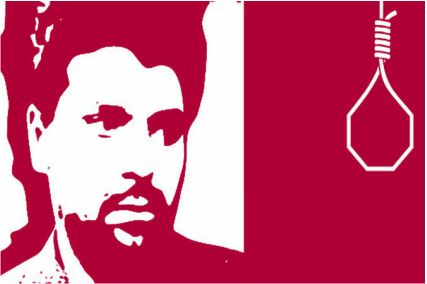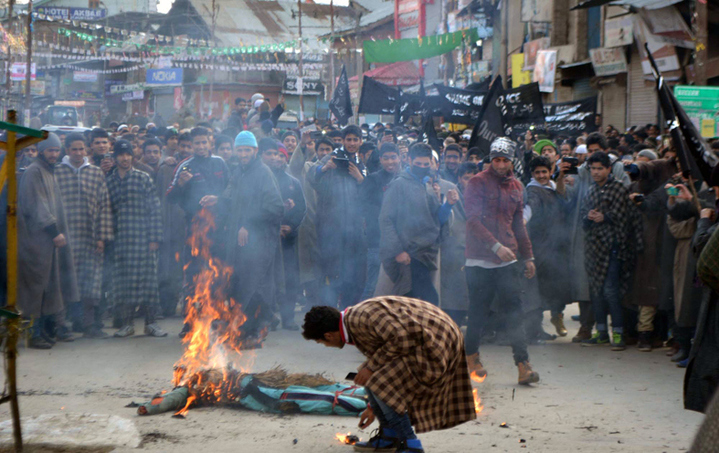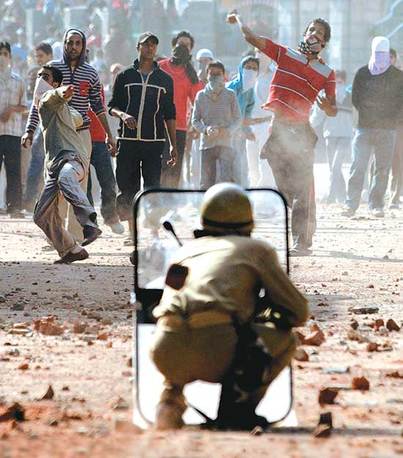 Hanging Yakub Memon would nothing but make but make killers of us all! Representative graphics. Courtesy- inagist.com
Hanging Yakub Memon would nothing but make but make killers of us all! Representative graphics. Courtesy- inagist.com
On the late hours of Wednesday as the President of India rejected 1993 Bombay bombings convict Yakub Memon’s mercy petition on his death sentence, the curtains were finally pulled over a more than 20-year long legal quest. Apparently, Memon will sentient his last dusk, will be experiencing a living darkness a last time, for after his execution at 7 in the morning of July 30, few minutes of pain will be filled with a never ending macabre of darkness.
May be this is the end to Yakub Memon saga, but the biggest question is, is this an end to terrorism or hatred? As the television channels were relentlessly covering the final hearing of Yakub Memon’s death sentence in the Supreme Court, I saw a gentleman who lost his kin in the mortifying blast expressing his stance over the upholding of Memon’s death sentence by the apex court. He acted happy and content, according to him, Yakub Memon’s execution will bring justice to the victims and their families. But, more than the feeling of contentment as a recipient of justice, his eyes spoke the triumph of vengeance! Which perhaps makes us question, will the hanging of Yakub Memon really bring justice or it will satisfy our warm blood of revenge?
It seems asking questions on the degree of sentence in the case of Yakub Memon, there’s been a paradigm shift from the real subject. While the debate should have been if capital punishment be awarded to Memon, the debate mostly hovered on if Yakub Memon be accorded death penalty. But, certainly this entire episode has reintegrated the echo of a fresh debate on the relevance of capital punishment.
According to Amnesty International, there are thousands of people in this country who believe that the use of death penalty is arbitrary, flawed and biased. Death penalty is merely short term revenge and death in any form can’t bring justice to anyone. Moreover, death and a few minutes of fear before it is not what can be termed as punishment. We have been made to believe that death penalty might work as a deterrent towards the crime rate or creating fear in the minds of the perpetrators. However, there’s no evidence or research to suggest that death penalty actually succeeded in bringing down the crime rate or created a sense of fear. A shocking survey reveals that in western countries where death penalty is still prevalent, the crime rate is higher than the countries which have abolished capital punishment.
Coming back to Yakub Memon, I would have compelled to believe that Yakub’s execution is an act of sheer justice only if it can promise that with Yakub’s death there will be deterrence in terrorism, it will instill a fear among anti-national organizations, it will bring down the crime rate at large. And if that can’t be vouched, hanging Yakub would be termed nothing more than a legal murder! Killing can never transform a society; it cannot serve or justify a community or society in any form. There’s a lot more to do, to make the society grow.
Television coverage showed visuals of crowd cheering slogans of Bharat Mata Ki Jai outside Nagpur jail; people clicking selfies and added to it anchors discussing about the size of the rope and breakfast menu before Yakub’s execution! It makes me wonder, are these celebration for justice or we are quenching our thirst of revenge?
Hanging Yakub Memon would nothing but make but make killers of us all. While the 1993 blasts or any unlawful killing is extremely lamentable, the state awarding capital punishment is simply another act of killing! The mere difference is this is under the legal frame work and is an organized killing; therefore we are bound to accept it. But, the process barely justifies the result, for a killing is a killing, be it legally or illegally!
According to the law, only the rarest of the rare cases deserve capital punishment but earlier, while examining the parameters of the rarest of the rare cases, the opinion of the society must also be considered in course of judgment. Now, this in itself is very shocking. How can the combined social will towards a particular case be surveyed? Does this mean that the judicial system must go along with the street noises? If a person is against death penalty in a particular case, how can they register their discontentment? If that’s really the case, why a galore of country’s bigwig voices for Yakub Memon, go unheard?
I suppose, to uplift the society in terms of aesthetic and moral grounds, focus should be on creating a space for education, acuity, equal access to justice and legal opportunity and eradication of poverty instead of just killing the offenders.
Justice must prevail and nobody is above law, as law abiding citizens we comply by the virtue of a pristine judiciary. But, I will have a more firm believe in the country’s highest body when stringent punishment is ensured for every perpetrator behind gruesome crimes including the likes of Pragya Thakur, Dara Singh, Aseemanand, Purohit among others. The law is certainly equal for all be it an accused of 1993 Bombay blast or 2002 Gujarat carnage, be Yakub Memon or someone holding an powerful political stature, nobody should go scot free!
(The first version of the article was published in countercurrents.org and Kashmir Monitor)
No unauthorized publication or use of any content allowed without prior permission | All rights reserved by the author | Feel free to Share via buttons displayed on the left.
May be this is the end to Yakub Memon saga, but the biggest question is, is this an end to terrorism or hatred? As the television channels were relentlessly covering the final hearing of Yakub Memon’s death sentence in the Supreme Court, I saw a gentleman who lost his kin in the mortifying blast expressing his stance over the upholding of Memon’s death sentence by the apex court. He acted happy and content, according to him, Yakub Memon’s execution will bring justice to the victims and their families. But, more than the feeling of contentment as a recipient of justice, his eyes spoke the triumph of vengeance! Which perhaps makes us question, will the hanging of Yakub Memon really bring justice or it will satisfy our warm blood of revenge?
It seems asking questions on the degree of sentence in the case of Yakub Memon, there’s been a paradigm shift from the real subject. While the debate should have been if capital punishment be awarded to Memon, the debate mostly hovered on if Yakub Memon be accorded death penalty. But, certainly this entire episode has reintegrated the echo of a fresh debate on the relevance of capital punishment.
According to Amnesty International, there are thousands of people in this country who believe that the use of death penalty is arbitrary, flawed and biased. Death penalty is merely short term revenge and death in any form can’t bring justice to anyone. Moreover, death and a few minutes of fear before it is not what can be termed as punishment. We have been made to believe that death penalty might work as a deterrent towards the crime rate or creating fear in the minds of the perpetrators. However, there’s no evidence or research to suggest that death penalty actually succeeded in bringing down the crime rate or created a sense of fear. A shocking survey reveals that in western countries where death penalty is still prevalent, the crime rate is higher than the countries which have abolished capital punishment.
Coming back to Yakub Memon, I would have compelled to believe that Yakub’s execution is an act of sheer justice only if it can promise that with Yakub’s death there will be deterrence in terrorism, it will instill a fear among anti-national organizations, it will bring down the crime rate at large. And if that can’t be vouched, hanging Yakub would be termed nothing more than a legal murder! Killing can never transform a society; it cannot serve or justify a community or society in any form. There’s a lot more to do, to make the society grow.
Television coverage showed visuals of crowd cheering slogans of Bharat Mata Ki Jai outside Nagpur jail; people clicking selfies and added to it anchors discussing about the size of the rope and breakfast menu before Yakub’s execution! It makes me wonder, are these celebration for justice or we are quenching our thirst of revenge?
Hanging Yakub Memon would nothing but make but make killers of us all. While the 1993 blasts or any unlawful killing is extremely lamentable, the state awarding capital punishment is simply another act of killing! The mere difference is this is under the legal frame work and is an organized killing; therefore we are bound to accept it. But, the process barely justifies the result, for a killing is a killing, be it legally or illegally!
According to the law, only the rarest of the rare cases deserve capital punishment but earlier, while examining the parameters of the rarest of the rare cases, the opinion of the society must also be considered in course of judgment. Now, this in itself is very shocking. How can the combined social will towards a particular case be surveyed? Does this mean that the judicial system must go along with the street noises? If a person is against death penalty in a particular case, how can they register their discontentment? If that’s really the case, why a galore of country’s bigwig voices for Yakub Memon, go unheard?
I suppose, to uplift the society in terms of aesthetic and moral grounds, focus should be on creating a space for education, acuity, equal access to justice and legal opportunity and eradication of poverty instead of just killing the offenders.
Justice must prevail and nobody is above law, as law abiding citizens we comply by the virtue of a pristine judiciary. But, I will have a more firm believe in the country’s highest body when stringent punishment is ensured for every perpetrator behind gruesome crimes including the likes of Pragya Thakur, Dara Singh, Aseemanand, Purohit among others. The law is certainly equal for all be it an accused of 1993 Bombay blast or 2002 Gujarat carnage, be Yakub Memon or someone holding an powerful political stature, nobody should go scot free!
(The first version of the article was published in countercurrents.org and Kashmir Monitor)
No unauthorized publication or use of any content allowed without prior permission | All rights reserved by the author | Feel free to Share via buttons displayed on the left.

This work is licensed under a Creative Commons Attribution-NonCommercial-NoDerivs 3.0 Unported License.






